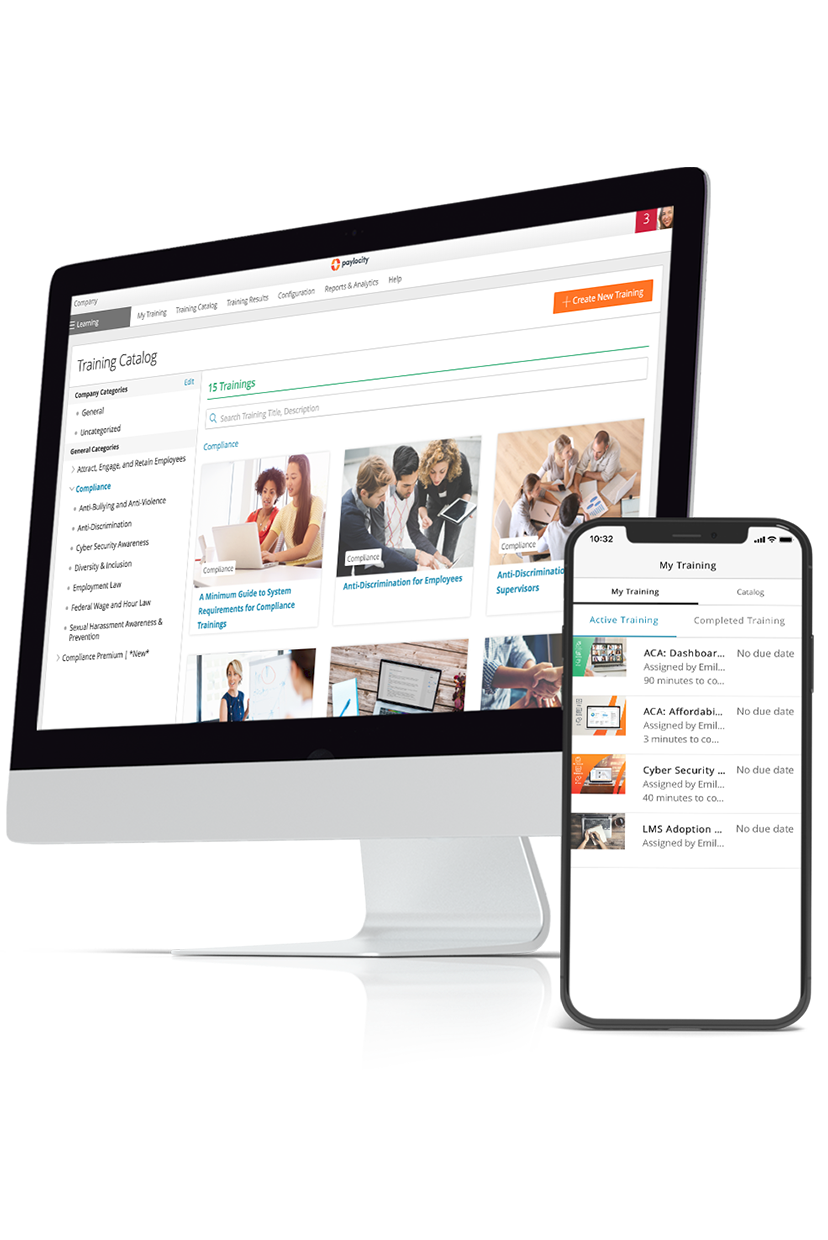resources
Top 5 Talent Development Strategies
July 25, 2022
Improve your employee recruiting, engagement, and retention by creating a future-proof talent development strategy.
Blog Post

Employers recognize the need to upskill and reskill their talent to achieve better business outcomes and retain talent. Employees understand their career growth depends on being able to contribute to their organizations in meaningful ways. And when organizations fail to invest in employee development, employees are more than ready to bail. Career growth opportunities are the number one reason people change jobs today. Additionally, over 90% of job seekers say they want organizations that offer strong training and upskilling programs.
As organizations try to keep their heads above water with ongoing labor market fluctuations, creating a comprehensive employee training and development strategy is one of the best investments to make. By investing in your employees, you invest in the organization’s future.
Let’s dive into the foundations of talent development and some actionable strategies you can incorporate into your own employee learning and development program.
What Is Talent Development?
Talent development facilitates employee growth and harnesses individual potential to further organizational goals, outcomes, and ultimately, success. Organizations that get it right visualize the cause and effect relationship between employee performance and satisfaction and how well the organization functions.
Employees can benefit from two types of talent development: upskilling and reskilling. Upskilling prioritizes the development of skill sets directly related to their role so that employees can be more efficient and effective at their jobs. On the other hand, reskilling focuses on developing skills so that employees can transition smoothly to another role at the company. Together, these core elements of a talent development strategy ensure employees can be the best they can be in their current roles and pave the way for them to level up in your organization.
Talent Management vs. Talent Development
Talent management is the high-level umbrella under which talent development sits. While talent development involves the on-the-ground tools, resources, and touchpoints that directly facilitate individual employee growth, talent management is the overarching strategy that informs HR processes like recruitment, engagement, and retention.
Employee Learning vs. Employee Training
Learning and training are both important components of staff development, but they serve different purposes at different times in the employee journey.
Employee training is specific and ramps up during onboarding when employees need structured opportunities to get up to speed with the day-to-day responsibilities of their roles. For example, an employee onboarding into a health and safety role may need to complete occupational safety and health administration (OSHA) training before they can begin work.
Conversely, employee learning is the holistic process of integrating, understanding, and retaining knowledge or skills that an individual can apply to different situations and contexts. Learning helps employees connect the dots between what they do and what it impacts.
When employees learn, they can excel in situations that require them to apply their knowledge and skills, such as handling conflict, contributing to a brainstorming session, mentoring another employee, and coming up with novel ideas to overcome a challenge.
Why Is Talent Development Important?
Talent development is important because today's employees look for organizations to prioritize their learning and development and make it part of the culture and operations. Organizations that are intentional about developing talent within a company do a better job of attracting, recruiting, and retaining top employees. It’s forward-thinking to recognize staff development is foundational to organizational agility; invest in your employees today, and thrive when the next change hits.
The Benefits of Employee Development and Training
Staff development is here to stay and garners increasing investment from stakeholders across organizations. Over 70% of talent development professionals report that learning and development have become a strategic function in their organizations. So what are the benefits of making employee growth part of your business strategy?
- Employee retention increases
- Employees become more engaged
- Your organization becomes more attractive to top talent
- Employee productivity increases and performance improves
- Customers are happier
Understanding Your Talent Development Philosophy
Your talent philosophy is your organization’s beliefs about the nature, value, and impact of talent. Without a defined talent philosophy, leaders and managers will rely on the biases they have when growing and managing their teams, and overall employee development will be inconsistent throughout the organization.
Compared to other organizations, companies that are more intentional about their talent development philosophy are better at:
- Reducing siloed thinking and redundancies by aligning leadership and management with a unified development perspective
- Creating a consistent employee experience, so your entire workforce has equal opportunity to grow
- Increasing HR’s perception as a strategic partner, as developing a cohesive talent development philosophy is a cross-functional effort that affects the entire organization
It’s important to have discussions with leadership about their talent development philosophy at the outset, and HR professionals are uniquely positioned to be employee development advocates. To guide discussions, consider the following questions:
- Are skills inherent or can they be developed?
- Should we dedicate development resources to a few high performers or the many solid performers?
- Do the above apply to all roles within the company, or just some?
A defined talent philosophy creates a consistent outlook across an organization that can then be used to build a talent development framework. Once your organization is aligned, you can start infusing it into your talent management strategy, including hiring practices, core competencies, and overall employee development tactics.
Top Talent Development Strategies
Consider the following talent development strategies and tactics to improve overall employee engagement, performance, and retention.
1. Democratize Learning
While there’s value to hiring an outside expert to create a learning module or give a workshop, it’s invaluable to tap into the expertise within your walls. Nobody else understands your organization’s perspective, needs, and goals as well as the people who work for it, so allow them to share their knowledge. Your own employees can be your best development resource.
Democratize learning by allowing your internal subject matter experts to educate your workforce on their skill sets. If you have an account manager who sends the best client emails in the world and never misses a beat with timely internal communication, empower them to teach their peers.
Peer-to-peer learning benefits both parties; the teacher gets to share their knowledge and feel a sense of expertise while the peer receives best-fit learning for their day-to-day work.
Technology makes it easier than ever to disseminate expertise across an organization. Have your chosen experts record a video of themselves explaining or teaching a concept. You can have peers lead regular training sessions or function as a mentor, but video communication allows you to easily share the knowledge, preserve for future use, and even humanize the learning experience making it more powerful for learners across your organization. Employees will also appreciate learning more if it’s accessible on demand and suits their preferences for content consumption.
2. Create a Culture of Learning
To make employee growth part of your organization’s culture, it needs to be a regular part of work-life, not a once-in-a-blue-moon type activity.
- Make employee learning and development about more than KPIs. While it’s important to verify every employee completed their yearly training, go beyond the numbers and assess whether they’ve developed the skills necessary to succeed. Provide development opportunities for employees to test out their new skills, such as letting them build their project management skills by setting the agenda for an upcoming meeting.
- Secure executive buy-in. Plain and simple, if your leadership isn’t on board and actively having conversations about learning and developing, nobody will be.
- Involve management and team members. Managers often say they have little time to facilitate learning. With delegation, time management, and support from leadership, managers can become front-line promoters of learning and development on their teams. Also invite employees to participate in town hall-style meetings to discuss new directions, problem-solve together, and provide feedback.
- Communicate with prospective employees about your learning and development opportunities. Continue communication once the onboarding process is complete.
- Embed employee development in all channels of the organization—collaboration software, HR and payroll, email, and more. When learning is part of every digital touchpoint, it becomes part of the culture. Opt for an HR and payroll solution that includes a learning management system (LMS) integration, so employees don’t have to travel from their desk to find information relevant to their growth.
- Make learning fluid. Establish, track, and check off learning and development goals. Take a magnifying glass to your talent development strategy, refine and revise as conditions change at your organization. Learning isn’t a moment in time; it’s an ongoing process.
3. Leverage Talent Development Technology
One of the best ways to increase employee skills and development opportunities is to use technology as the foundation of your talent strategy. HR technology has evolved to make learning and development even more accessible for your workforce and easier for your organization to set up.
- Use an LMS to spearhead staff development. A high-quality option offers learning modalities—video, webinar, on-demand—to suit every learner.
- Offer mobile training opportunities so employees can access learning anywhere they carry a mobile device.
- Incorporate self-guided employee training to offer a higher level of autonomy and competency. Give employees choices so that they can guide their learning.
- Start an open dialogue with your employees by using surveys. Ask them what’s working and what support they need, and assess learning and development upon completion of learning activities.
- Set employees up with performance journals, which involve staff in their development by providing a space for them to set, track, and reflect on goals. Managers can comment on journal entries to provide feedback or kudos. Employees don’t have to wait for yearly reviews to continue learning and growing.
4. Personalize Learning Through Individual Development Plans and One-on-Ones
Your workforce wants to know that employee growth is a priority, but every employee is unique. Workers come to organizations with a blend of previous experiences and a one-size-fits-all talent development strategy doesn’t work. Employees need a personalized approach to their learning and development. This can be achieved by creating individualized development plans and regular one-on-ones with managers or supervisors.
Have managers work with their teams on individual development plans that are customized to each employee’s needs. Outline the specific goals they’d like to achieve, the skills needed to attain those goals, and the next steps needed to grow. This plan should be clearly documented with measurable goals and actionable next steps. It demonstrates to your employees that you care about their growth and provides a defined development track for them to peruse.
Pair these plans with regular one-on-ones with supervisors or managers, a talent management best practice, to ensure development stays on track. Utilize this time to discuss any challenges they face and provide guidance so they can come out on top—and learn while doing it. Not only is this time for your leaders to build rapport with their direct reports, but it’s also an opportunity to gather intel to refine your talent development strategy.
Learn More: Career Pathing: Why It Matters & How to Get Started
5. Integrate Ongoing Employee Coaching
If your organization still relies heavily on the yearly review as the bulk of your talent management strategy, you’re not alone. Many organizations recognize staff development is vital to the future, but it’s getting to be more of an antiquated practice. One way to step forward is to integrate ongoing employee coaching.
Employee coaching is the act of teaching or training talent to reach a goal. Your organization can utilize it to help an employee improve an existing skill set or expand into a new one, depending on what’s required by the organization. Peers, mentors, managers, or leadership can provide coaching.
Coaching differs from a performance review or manager check-ins because it’s ongoing, in-depth support. A coach will:
- Provide positive feedback to encourage employee growth
- Discuss the goal or challenge openly
- Discuss solutions, approaches, or milestones
- Establish a plan for achieving the desired outcome
- Set a time and date to follow up
- Make adjustments as necessary until the employee reaches the goal
What’s essential is that the coach doesn’t give the employee all of the answers; they provide space and guidance for the employee to find those answers themselves.
Employee coaching not only takes the pressure off performance but it’s also a smart strategy for increasing employee engagement.
How to Measure Talent Development
Measuring talent development is twofold, starting with individual employee feedback and utilizing data analytics to track metrics.
First, ask your employees how they’re doing and solicit their feedback on your talent development program. You can send out employee surveys asking them to give your learning modules, manager meetings, and other programs a grade. Ask them what works and where there’s room for improvement. Then, see what changes you can make.
Next, dig into the data. Check the following HR metrics:
- Employee engagement
- Employee retention
- External vs. internal hiring rates
- High-performer turnover rates
If your learning and development program is robust, impactful, and meets the needs of employees and the organization, you will see that reflected in the data. Workers want organizations to invest in employee development. And they will be more likely to engage, stay, and reach for promotions if yours does.
Improve Your Talent Development Strategy
Just like employees have room to grow, so do organizations, and identifying your start line is essential to improving your talent development strategy. While your organization’s talent management philosophy depends on your industry, size, mission, vision, and values, the single factor that transcends all the differences between organizations is the importance of technology. Bottom line: Your talent development strategy needs a technology foundation to reach the stars. Let us help you get started. Request a demo for more information about our HR and talent development solutions.

Grow Your Talent with Better Training
Now, more than ever, employees want more career development opportunities from their employers. The right Learning Management System (LMS) can help develop new skills while training your workforce on company policies, products, and more. Empower your employees to grow professionally with LMS, a modern, mobile solution that fits different learning styles and connects to your existing systems and processes.


